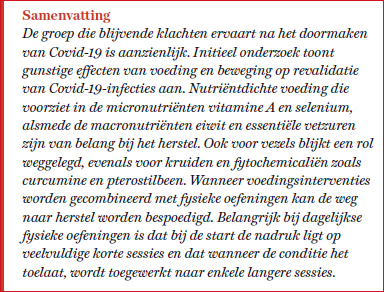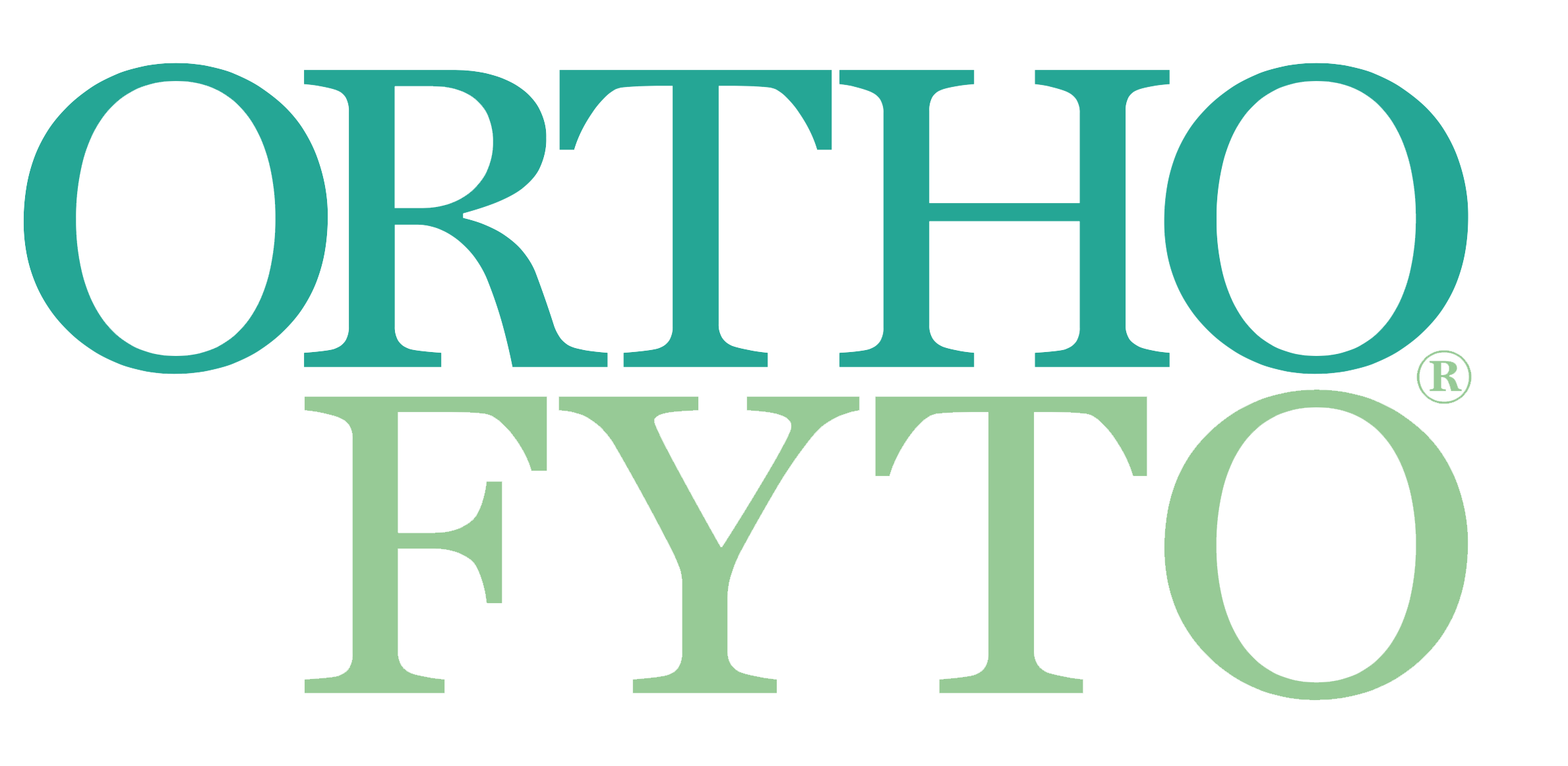Blijvende vermoeidheidsklachten na Covid-19: Behandelen met beweging, voeding en suppletie
21 May, 2021
Door: Juglen Zwaan

Een infectie met het coronavirus verloopt bij de meeste mensen relatief mild. In veel gevallen is er geen sprake van blijvende klachten. Toch is de groep die ze wel ervaart aanzienlijk. Een recente studie, gepubliceerd in Nature Medicine, meldt blijvende klachten bij 13% van de met SARS-CoV-2 geïnfecteerden.1 In dat geval spreken we van CCS: het chronische covid syndroom. Andere studies stelden al eerder blijvende klachten na Covid-19 vast, met percentages variërend van 10 tot 30%.2-4
Uit een systematische review en meta-analyse blijkt dat de lijst met CCS-klachten bijzonder lang is; er zijn meer dan 50 langetermijneffecten vastgesteld.5 De meest voorkomende klachten zijn vermoeidheid, hoofdpijn, concentratieproblemen, haaruitval en benauwdheid. Schade aan het hart is vaak na het doormaken van de ziekte nog lange tijd zichtbaar, ook bij professionele sporters die op dagelijkse basis trainen. Veel patiënten melden een blijvend verlies van reuk- en smaakvermogen, spierpijn en gewrichtsklachten. In de meeste gevallen hebben patiënten last van meerdere klachten tegelijk. Bij veel mensen leidt dit tot mentale problemen, zoals depressie en angst.6
Wereldwijd is veel belangstelling voor het herstel van CCS en de beschikbare informatie die in de medische literatuur te vinden is groeit met de dag. Dat maakt dat er inmiddels wel degelijk aanwijzingen zijn verschenen waarmee een behandelaar in de praktijk kan experimenteren. Het doormaken van een Covid-19-infectie gaat gepaard met heftige ontstekingen. Door middel van de juiste voeding kunnen deze ontstekingsprocessen worden bijgestuurd, waardoor het verloop en de afloop aanzienlijk kunnen verbeteren.7,8
Patiënten die herstellen van een Covid-19-infectie hebben meestal een verhoogde behoefte aan energie, omdat de strijd tegen het virus veel energie heeft gekost. Tegelijkertijd eten patiënten tijdens het doormaken van de infectie minder, waardoor het lichaam is uitgeput. Bij overgewicht is het zaak om te kiezen voor voeding met een hoge nutriëntendichtheid, dat wil zeggen voedsel dat per calorie zoveel mogelijk essentiële micronutriënten bevat. Bij ondergewicht is het verstandig om tijdelijk het aantal calorieën te verhogen, zodat het lichaam de energie krijgt om op krachten te komen en te werken aan het herstel. Bij sommige patiënten kan deze fase zes maanden duren. Belangrijk is dat de maaltijden in deze periode voldoende vezels, eiwitten en de juiste vetten bevatten.
www.ahealthylife.nl, www.juglenzwaan.nl
Lees het gehele artikel vanaf pagina 16 in OrthoFyto 3/21.
Wilt u het gehele artikel als PDF bestand ontvangen? Bestel het dan hier voor € 3,50.
Bronvermelding:
1. Sudre CH, Murray B, Varsavsky T, et al. Attributes and predictors of long COVID. Nat Med. 2021.
2. Logue JK, Franko NM, McCulloch DJ, et al. Sequelae in Adults at 6 Months After COVID-19 Infection. JAMA Netw Open. 2021; 4(2):e210830.
3. Greenhalgh T, Knight M, A’Court C, Buxton M, Husain L. Management of post-acute covid-19 in primary care. BMJ. 2020;
4. Rubin R. As Their Numbers Grow, COVID-19 ‘Long Haulers’ Stump Experts. JAMA. 2020; 324(14):1381.
5. Lopez-Leon, S., Wegman-Ostrosky, T., Perelman, C., Sepulveda, R., Rebolledo, P. A., Cuapio, A., & Villapol, S. (2021). More than 50 long-term effects of covid-19: A systematic review and meta-analysis. medRxiv [Preprint]. 2021 Jan 30:2021.01.27.21250617.
6. Perlis RH, Ognyanova K, Santillana M, et al. Association of Acute Symptoms of COVID-19 and Symptoms of Depression in Adults. JAMA Netw Open. 2021; 4(3):e213223.
7. Zabetakis I, Lordan R, Norton C, Tsoupras A. COVID-19: The Inflammation Link and the Role of Nutrition in Potential Mitigation. Nutrients. 2020 May 19;12(5):1466.
8. Eiser AR. Could Dietary Factors Reduce COVID-19 Mortality Rates? Moderating the Inflammatory State. The Journal of Alternative and Complementary Medicine. 2021; 27(2):176-178.
9.Yeoh YK, Zuo T, Lui GC, et al. Gut microbiota composition reflects disease severity and dysfunctional immune responses in patients with COVID-19. Gut. 2021; 70(4):698-706.
10. Dang AT, Marsland BJ. Microbes, metabolites, and the gut–lung axis. Mucosal Immunol. 2019; 12(4):843-850.
11. Baxter NT, Schmidt AW, Venkataraman A, Kim KS, Waldron C, Schmidt TM. Dynamics of Human Gut Microbiota and Short-Chain Fatty Acids in Response to Dietary Interventions with Three Fermentable Fibers. mBio. 2019; 10(1):e02566-18.
12. Wischmeyer PE. Tailoring nutrition therapy to illness and recovery. Crit Care. 2017; 21(S3).
13. Caccialanza R, Laviano A, Lobascio F, et al. Early nutritional supplementation in non-critically ill patients hospitalized for the 2019 novel coronavirus disease (COVID-19): Rationale and feasibility of a shared pragmatic protocol. Nutrition. 2020; 74:110835.
14. Iddir M, Brito A, Dingeo G, et al. Strengthening the Immune System and Reducing Inflammation and Oxidative Stress through Diet and Nutrition: Considerations during the COVID-19. Crisis Nutrients. 2020; 12(6):1562.
15. Arnardottir H, Pawelzik S, Öhlund Wistbacka U, et al. Stimulating the Resolution of Inflammation Through Omega-3 Polyunsaturated Fatty Acids in COVID-19: Rationale for the COVID-Omega-F Trial. Front. Physiol.. 2021; 11.
16. Duvall MG, Levy BD. DHA- and EPA-derived resolvins, protectins, and maresins in airway inflammation. European Journal of Pharmacology. 2016; 785:144-155.
17. Zabetakis I, Lordan R, Norton C, Tsoupras A. COVID-19: The Inflammation Link and the Role of Nutrition in Potential Mitigation. Nutrients. 2020; 12(5):1466.
18. Jafar N, Edriss H, Nugent K. The Effect of Short-Term Hyperglycemia on the Innate Immune System. The American Journal of the Medical Sciences. 2016; 351(2):201-211.
19. National Health Service (NHS). After-Care Needs of Inpatients Recovering from COVID-19. Version 2.
20.Calder P, Carr A, Gombart A, Eggersdorfer M. Optimal Nutritional Status for a Well-Functioning Immune System Is an Important Factor to Protect against Viral Infections. Nutrients. 2020; 12(4):1181.
21. Zhang J, Taylor EW, Bennett K, Saad R, Rayman MP. Association between regional selenium status and reported outcome of COVID-19 cases in China. 2020; 111(6):1297-1299.
22. B.M. Ellen ter, N. Dinesh Kumar, E.M. Bouma, B. Troost, D.P.I. Pol van de, H.H. Ende van der-Metselaar, L. Apperloo, D. Gosliga van, M. Berge van den, M.C. Nawijn, P.H.J. Voort van der, J. Moser, I.A. Rodenhuis-Zybert, J.M. Smit. Resveratrol And Pterostilbene Potently Inhibit SARS-CoV-2 Infection In Vitro. bioRxiv 2020.09.24.285940.
23. Liu Y, You Y, Lu J, Chen X, Yang Z. Recent Advances in Synthesis, Bioactivity, and Pharmacokinetics of Pterostilbene, an Important Analog of Resveratrol. Molecules. 2020; 25(21):5166.
24. Rocha FAC, Assis MR. Curcumin as a potential treatment for COVID‐19. Phytotherapy Research. 2020; 34(9):2085-2087.
25. Park J, Park R, Jang M, Park Y. Therapeutic Potential of EGCG, a Green Tea Polyphenol, for Treatment of Coronavirus Diseases. Life. 2021; 11(3):197.
26. Jian’an Li, Wenguang Xia, Chao Zhan, Shouguo Liu, Zhifei Yin, Jiayue Wang, Yufei Chong, Chanjuan Zheng, Xiaoming Fang, Wei Cheng, Jan D. Reinhardt. Effectiveness of a telerehabilitation program for COVID-19 survivors (TERECO) on exercise capacity, pulmonary function, lower limb muscle strength, and quality of life: a randomized controlled trial. medRxiv 2021.03.08.21253007.
27. Phelan D, Kim JH, Chung EH. A Game Plan for the Resumption of Sport and Exercise After Coronavirus Disease 2019 (COVID-19) Infection. JAMA Cardiol. 2020; 5(10):1085.
28. Heller RA, Sun Q, Hackler J, Seelig J, Seibert L, Cherkezov A, Minich WB, Seemann P, Diegmann J, Pilz M, Bachmann M, Ranjbar A, Moghaddam A, Schomburg L. Prediction of survival odds in COVID-19 by zinc, age and selenoprotein P as composite biomarker. Redox Biol. 2021 Jan;38:101764.
